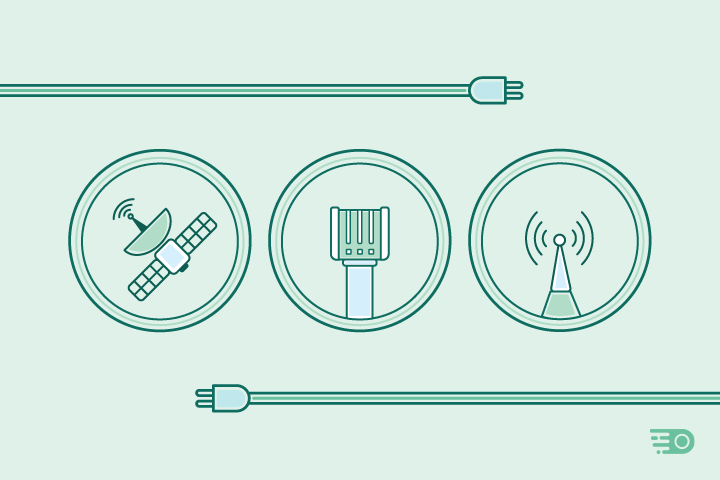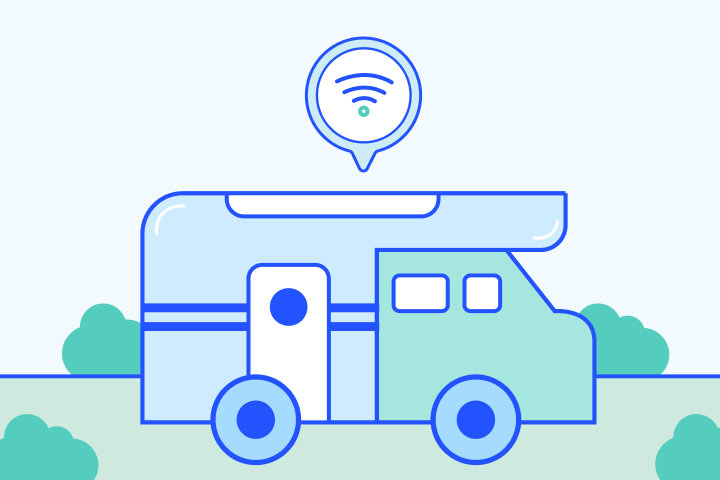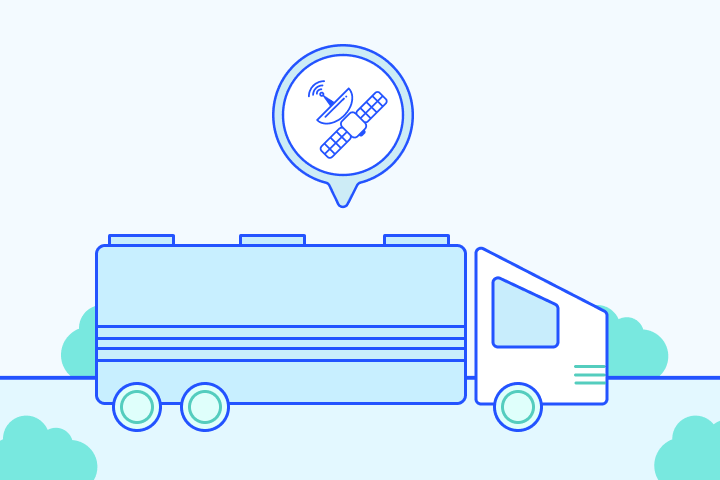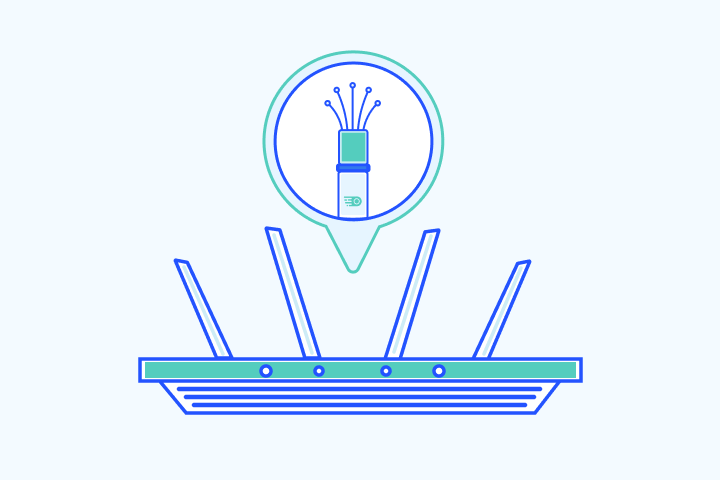Which Type of Internet Connection Is Best for You?

HighSpeedOptions prides itself on providing honest, quality content. While we may be compensated when you make a purchase through links on our site, all opinions are our own. Here's how we make money.
Table of Contents
What are the main types of internet connections, and which is best for your home?
There are six main types of internet connections:
- Fiber internet
- Cable internet
- DSL internet
- Satellite internet
- Fixed wireless internet
- 5G internet
Each type differs in speed, pricing, and availability. This guide breaks down each internet connection type and suggests internet providers so you can compare options and find the best fit for your budget and household.
Key Takeaways: The Best Internet Connection Type for You
- Compare connection types to see which connection suits your internet lifestyle and needs.
- Fiber internet is the fastest and most reliable option, offering symmetrical speeds up to 2,000 Mbps—but availability is still limited.
- Cable internet is widely available and delivers high speeds, making it ideal for streaming, gaming, and most households.
- DSL internet is a budget-friendly option with slower speeds, best suited for light browsing and smaller households.
- Satellite internet works virtually anywhere, especially in rural areas, but suffers from high latency and weather-related disruptions.
- Fixed wireless serves underserved regions with simple setup but slower speeds and line-of-sight limitations.
- 5G home internet promises ultra-fast speeds and low latency, but coverage is still expanding and varies by location.

How Do Internet Connection Types Compare?
Most urban areas offer fast fiber or cable internet. But satellite, DSL, or fixed wireless internet are the most accessible types of internet in rural areas.
Compare the various internet connection types by speed, price, and nationwide availability in the table below.
Internet Connection Types at a Glance
| Internet Type | Download Speed Range* | Starting Price Range* | % of US Pop. with Access** |
| Fiber | 200 – 2,000 Mbps | $35.00 – $299.95/mo. | 40% |
| Cable | 25 – 1,000 Mbps | $19.99 – $120.00/mo. | 88% |
| DSL | 10 – 150 Mbps | $19.99 – $69.99/mo. | 89% |
| Satellite | 12 – 150 Mbps | $49.99 – $99.00/mo. | 99% |
| Fixed Wireless | 5 – 50 Mbps | $29.99 – $99.00/mo. | 43% |
| 5G | 50 – 1000 Mbps | $50.00 – $70.00/mo. | N/A |
| Internet Type | Fiber |
| Download Speed Range* | 200 â 2,000 Mbps |
| Starting Price Range* | $35.00 â $299.95/mo. |
| % of US Pop. with Access** | 40% |
| Internet Type | Cable |
| Download Speed Range* | 25 â 1,000 Mbps |
| Starting Price Range* | $19.99 â $120.00/mo. |
| % of US Pop. with Access** | 88% |
| Internet Type | DSL |
| Download Speed Range* | 10 â 150 Mbps |
| Starting Price Range* | $19.99 â $69.99/mo. |
| % of US Pop. with Access** | 89% |
| Internet Type | Satellite |
| Download Speed Range* | 12 â 150 Mbps |
| Starting Price Range* | $49.99 â $99.00/mo. |
| % of US Pop. with Access** | 99% |
| Internet Type | Fixed Wireless |
| Download Speed Range* | 5 â 50 Mbps |
| Starting Price Range* | $29.99 â $99.00/mo. |
| % of US Pop. with Access** | 43% |
| Internet Type | 5G |
| Download Speed Range* | 50 â 1000 Mbps |
| Starting Price Range* | $50.00 â $70.00/mo. |
| % of US Pop. with Access** | N/A |
*All speeds and prices are ranges based on current internet provider plans, which vary by location and are subject to change.**Percentages are based on the FCC internet availability data as of 7/24/2025.
Top Providers By Internet Connection Type
| Provider | Connection | Contract Required | |
|---|---|---|---|
| CenturyLink | Fiber, DSL | No | View Plans |
| EarthLink | Fiber, DSL, Satellite, 5ghome | Yes | View Plans |
| Viasat | Satellite | Yes | View Plans |
| AT&T | Fiber, Fixed, 5ghome | Options Available | View Plans |
| Spectrum | Cable, Fiber | No | View Plans |
| Cox | Cable | Yes | View Plans |
| Frontier | Fiber, DSL | Options Available | call833-709-2188 |
| Optimum | Cable, Fiber | No | View Plans |
| Sparklight | Cable | No | View Plans |
| Verizon | Fiber, Fixed, 5ghome | No | View Plans |
| Xfinity | Cable | Options available | View Plans |
| Provider | CenturyLink |
|---|---|
| Connection | Fiber, Dsl |
| Contract Required | No |
| View Plans | |
| Provider | EarthLink |
| Connection | Fiber, Dsl, Satellite, 5ghome |
| Contract Required | Yes |
| View Plans | |
| Provider | Viasat |
| Connection | Satellite |
| Contract Required | Yes |
| View Plans | |
| Provider | AT&T |
| Connection | Fiber, Fixed, 5ghome |
| Contract Required | Options Available |
| View Plans | |
| Provider | Spectrum |
| Connection | Cable, Fiber |
| Contract Required | No |
| View Plans | |
| Provider | Cox |
| Connection | Cable |
| Contract Required | Yes |
| View Plans | |
| Provider | Frontier |
| Connection | Fiber, Dsl |
| Contract Required | Options Available |
| call833-709-2188 | |
| Provider | Optimum |
| Connection | Cable, Fiber |
| Contract Required | No |
| View Plans | |
| Provider | Sparklight |
| Connection | Cable |
| Contract Required | No |
| View Plans | |
| Provider | Verizon |
| Connection | Fiber, Fixed, 5ghome |
| Contract Required | No |
| View Plans | |
| Provider | Xfinity |
| Connection | Cable |
| Contract Required | Options available |
| View Plans | |
What Type of Internet Connection is Best?
If available, fiber internet is the fastest and most reliable option. It offers symmetrical speeds of up to 2,000 Mbps. Fiber is ideal for heavy users who have larger households, multi-family homes, or bandwidth-heavy jobs.
Since it’s a newer technology, fiber internet is the least available connection type. Internet service providers (ISPs) are still building the infrastructure needed to expand fiber availability. It’s also why fiber plans are generally more expensive. If you can’t get fiber where you live, check out what other connections have to offer below.
Fiber Internet
Fiber internet uses light, rather than electric signals, to transfer data along fiber-optic glass cables. The fibers are bundled together into a cable that is capable of transmitting data at nearly the speed of light. The technology greatly reduces internet latency (the time it takes for data to travel from your device to a server and back) and makes faster speeds possible as it evolves.
Overall, fiber offers the fastest speeds and can support the most device connectivity among internet options. It usually operates with symmetrical upload and download speeds, while other internet types have higher download speeds. Upload speeds – the speed at which you can transfer data from your device – are critical for activities like working from home, online learning, uploading photos and videos, and playing games online.
However, since fiber is not as readily available as DSL and cable internet and can be expensive, it only makes up about 1 in 4 internet subscribers today (or 23% of all U.S. households).
Pros
Fast download and upload speeds
Most reliable connection
Supports the most connected devices
Cons
Often expensive
Limited availability in the U.S.
Slow overbuild process
Our Top Fiber Pick:
Cable Internet
Cable internet transfers data via electrical signals through existing coaxial TV cables. While DSL is similar in that it relies on older networks, cable internet is usually more reliable and faster than DSL.
Cable service offers fast download speeds and is widely available, which makes it the leading choice for households today. Currently, 3 in 5 internet subscribers use cable internet (64% of all U.S. households).
Pros
2x the availability of fiber
Supports gaming and streaming
Fast download speeds
Cons
Slower speeds during peak hours
Limited availability in rural areas
Moderate to high prices
Our Top Cable Pick:
DSL Internet
DSL (Digital Subscriber Line) is one of the most widely available types of internet connection in the U.S. Similar to cable, DSL uses existing copper phone lines to transmit internet signals to your home.
DSL is faster than dial-up service but is still prone to dead spots, latency issues, and is slower than cable and fiber internet. It’s best for smaller households, users with fewer connected devices, or those looking for cheap internet. It is also commonly available in rural areas.
Pros
Affordable
2x the availability of fiber
Faster than dial-up
Cons
Slow to average speeds
Doesn’t support gaming well
Weak home coverage
Out Top DSL Pick:
Satellite Internet
Satellite internet is a wireless connection that transmits internet signals between satellites orbiting the Earth and satellite dishes on the ground – one at your provider’s main hub and another on your property. This connection type has the unique advantage of being available almost anywhere in the U.S., but it is subject to service interruptions caused by bad weather or poor equipment alignment.
Because of its availability, satellite internet is best suited for rural homes that can’t get wired connections to their property easily. Keep in mind that satellite internet will have variable speeds and high latency because data must travel to space and back. Speeds range from 25 Mbps to 150 Mbps.
Pros
Available almost anywhere
Can overcome physical barriers
Faster than dial-up
Cons
Tends to be expensive
Data caps are common
Unreliable due to physical elements and high latency
Our Top Satellite Pick:
Fixed Wireless Internet
Fixed wireless internet delivers internet via radio waves from cell towers. Like satellite internet, it’s often used in rural areas where wired cable connections are limited. Due to its wireless connection, it’s limited by line of sight requirements.
This connection is only recommended for households with minimal internet usage. It can support light activities like checking emails or browsing social media, but it won’t get you very far if you want to binge Netflix shows.
Pros
Delivers internet to underserved areas
Easy installation
Local customer service
Cons
Line of sight limitation
Slow speeds
Can be expensive
Out Top Fixed Wireless Pick:
5G Internet
Fifth-generation internet technology, or 5G, is the next evolution in wireless networks set to replace 4G, 3G, and LTE with far better performance. 5G networks are powered by new technology referred to as millimeter wave (mmWave) that runs on three different bands: low-band, mid-band, and high-band. These bands support speeds up to 100 Mbps, 1,000 Mbps, and 10 Gbps, respectively.
Although the technology is very new, 5G internet is capable of delivering faster speeds, lower latency, and increased connectivity than even fiber internet. After years of anticipation, internet providers like Verizon are starting to install 5G networks in select regions across the U.S.
Pros
Fastest speeds among all connections
Increased connectivity for more devices
Low latency
Cons
Cost and labor obstacles to overbuilding
Difficulty penetrating barriers
Very limited availability
Our Top 5G Pick:
Final Thoughts – Which Internet Connection Is Best for You?
There’s no one-size-fits-all answer. The best internet connection depends on where you live and how you use the internet. If you’re streaming, working from home, or gaming, fiber or cable is ideal. For rural areas, satellite or fixed wireless may be your best option.
Internet Connection Types Frequently Asked Questions (FAQ)
If available, fiber internet is the best option due to its high speeds, reliability, and symmetrical upload/download rates. Cable internet is a strong second choice, offering widespread coverage and fast performance for most households.
In rural areas where fiber or cable aren’t available, satellite and fixed wireless internet are often the best options. Satellite offers near-universal availability, while fixed wireless is great for light use in areas with line-of-sight access to towers.
Fiber internet is the fastest, with speeds up to 2,000 Mbps and beyond in select areas. It also supports symmetrical upload and download speeds, which is ideal for remote work and online gaming.
5G home internet can offer speeds comparable to cable or even fiber in some locations, but coverage is limited and performance depends on proximity to 5G towers. It’s promising, but not yet a universal replacement.
DSL is typically the most budget-friendly internet option, though it comes with slower speeds. It’s a solid choice for basic activities like browsing and email in smaller households.
Internet latency is the time it takes for data to travel from your device to a server and back. Lower latency means a more responsive internet experience, especially important for video calls, gaming, and real-time applications.
No. Fiber and cable are the best for streaming and gaming thanks to their high speeds and low latency. DSL and satellite may struggle with these activities due to slower speeds or higher latency.
Find providers in your area

Table of Contents











